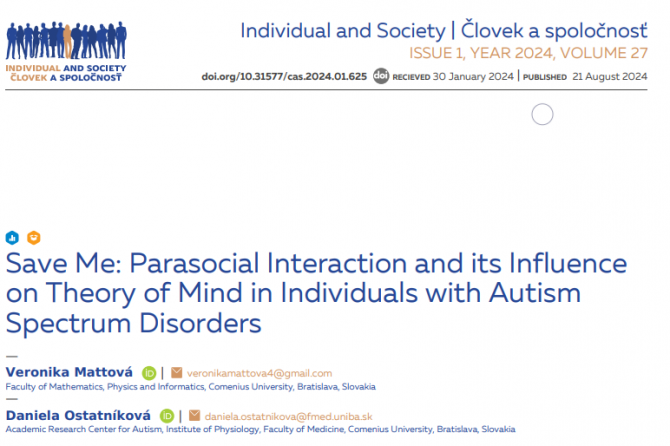
AUTORI: Mattová, V., Ostatníková, D.
ABSTRAKT: Background: „Save me“ is a plea often voiced by individuals seeking help. Yet, how can they be heard when no one is present? Individuals with Autism Spectrum Disorder (ASD) require special support in their development to enhance their theory of mind and empathy-related cognitive abilities, due to their neurodivergent differences. One such promising support is parasocial interaction (PSI). This new possible intervention for individuals with ASD seems especially well-tailored to allow specific access to a person’s imaginary world while providing a secure space with a neutral environment. This encourages an individual’s pace of growing and prospering. Objectives: ASD is a neurodevelopmental disorder characterized by social communication and interaction difficulties. Every innovative therapeutic intervention can be seen as a part of the bigger picture when discussing these conditions and diverse peculiar needs across the spectrum. PSI may provide a unique avenue to foster empathy and theory of mind. The aim of this work is to determine whether there is an association between the influence of parasocial interaction on individuals’ capacity to acquire specific abilities relevant to empathy and theory of mind. Methods: A multi-method approach with the application of four different types of questionnaires is used: Autism Spectrum Quotient Test (AQ), Empathy Quotient (EQ), Reading the Mind in the Eyes Test (RMET), and Parasocial Interaction (PSI) Questionnaire. Results: The data from 43 participants (ASD group: n = 21, neurotypical (NT) group: n = 22), investigating possible associations between 4 questionnaires, slightly suggesting the potential therapeutic implications of PSI for individuals with ASD, despite limitations such as sample size and gender differences. Results: Therefore, the results highlight the prospect of such interactions. These seem to be created on the basis of various impulses such as experiencing similar hardships, looking for help, and identifying with a character for endurance or bravery. They also show that parasocial interactions are significant for everyone, who has the inclination to benefit from being used as a medical intervention in additional care. Discussion and Conclusions: PSI has the potential to be considered as a useful tool in the treatment of ASD. With its secured and guarded options, an individual can explore and develop social-cognitive functions without the pressures to perform in the real world typically associated with these interactions. PSI offers individually designed methods, platforms, and strategies, making it a promising intervention for fostering cognitiveaffective development in individuals with ASD. Further research is desired in this area, to fully comprehend the therapeutic implications and potential of PSI.
Individual and Society ISSUE 1, YEAR 2024, VOLUME 27


